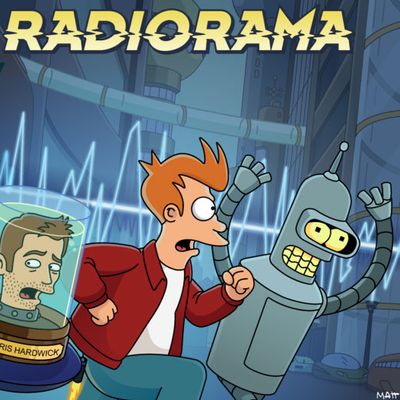
Radiorama, the one-off Futurama podcast revival that came out earlier this month, is an impressive feat of capitalism.
The podcast, which reunites the original cast of the cult cartoon that last aired in 2013, is a 44-minute-long canonical episode that just so happens to also be an elaborate piece of branded content. Radiorama was conceived to advertise another recent Futurama product thatÔÇÖs meant to bring fans back to New New York and the galaxies beyond: Worlds of Tomorrow, which is one of those freemium mobile games built around an established intellectual property ÔÇö or celebrity (see: Kim Kardashian and Blac Chyna) ÔÇö thatÔÇÖve absolutely mushroomed over the past half decade. Both the podcast and mobile game are free, but the notion of ÔÇ£freeÔÇØ is conditional here. The podcast imposes the usual advertising tax on your eardrums to promote Worlds of Tomorrow, while Worlds of Tomorrow does the typical freemium thing: The game play is more fun (or less unbearable) if you pump money into it. Which is all to say, Radiorama is basically a big fat ad that doubles as a plus-size nonvisual episode of Futurama, that further triples as a nostalgic experience for anybody who misses the beloved TV show.
Viewed askew, thereÔÇÖs an uncanny beauty to how Radiorama came to be. The whole thing wraps around itself in a strange and utterly compelling way: It is an ouroboros, a Matryoshka doll, an exceptionally dense layer cake of meta that gives rise to some continuation of the Futurama universe that has been killed and revived (and then killed again) over the years. To be clear, none of this is a knock on the project. If it leads to a perfectly serviceable episode of David X. Cohen and Matt GroeningÔÇÖs cartoon ÔÇö yet another brief opportunity to stay a little longer in this world, prolonging the showÔÇÖs jousts with its inevitable end ÔÇö then why not?
And perfectly serviceable it is! The podcast revival brings back many of the things that made the cartoon so adored: smart writing, incredible joke density, an endlessly fun world, little character touches like the whoop-whoop-whooping of Zoidberg, and moments of real heart and feeling. (The 2010 episode ÔÇ£The Late Philip J. FryÔÇØ remains one of my favorite watches ever.)
The plot is a suitably meta affair. Written by Cohen and Futurama staffers Ken Keeler and Patric M. Verrone, the story kicks off with news of a podcast revival for All My Circuits, the parodic soap-opera-within-the-show, but it soon transitions into a universe-in-threat affair featuring a villain named Klaxxon, a sentient audio wave made up of the sum of all 21st-century podcasts. (Yep.) The ever-ubiquitous podcast and television personality Chris Hardwick voices Klaxxon, which further adds to the podcast-on-podcast-on-podcast meta-gag. (Behind the scenes, HardwickÔÇÖs involvement was instrumental in getting Radiorama produced. Not only was the episode distributed through his flagship podcast, The Nerdist, but Hardwick is said to have pitched the idea of a podcast adaptation years earlier.) Some might find the whole meta shtick a little much, but itÔÇÖs not too different from the parodies and satirical takes Futurama deployed in the past.
ItÔÇÖs also striking to hear just how much of Futurama translates over to the podcast form. The voice performances are pretty much exactly what you remembered them to be, which is to say theyÔÇÖre great. The showÔÇÖs use of visual gags are swapped out for implied visual gags ÔÇö┬áthree-dimensional nude Fry imagery factors into the proceedings ÔÇö┬áwhich is inspired. The plot of the episode is zany in a way thatÔÇÖs familiar and therefore comforting. And the showÔÇÖs wit is delivered without any loss in quality. At several points, it lampoons the general conventions of podcast formatting, like host-read ads, to pretty good effect. (Even the actual ad-reads for Worlds of Tomorrow ainÔÇÖt half-bad.) But RadioramaÔÇÖs most enduring achievement is the way it captures the sensibility of a cartoon through a purely nonvisual avenue ÔÇö the way it evokes a sense of electric color through energetic pacing, deft use of sound effects, and voice acting thatÔÇÖs pitched at just the right level.
Radiorama is a strange kind of achievement. ItÔÇÖs a successful revival thatÔÇÖs also an effective adaptation, a wholly novel product thatÔÇÖs also a marvel of capitalism. That itÔÇÖs a one-off is a sad thing. I could easily inhale a whole season of this, and it would feel pretty close to the real thing.


